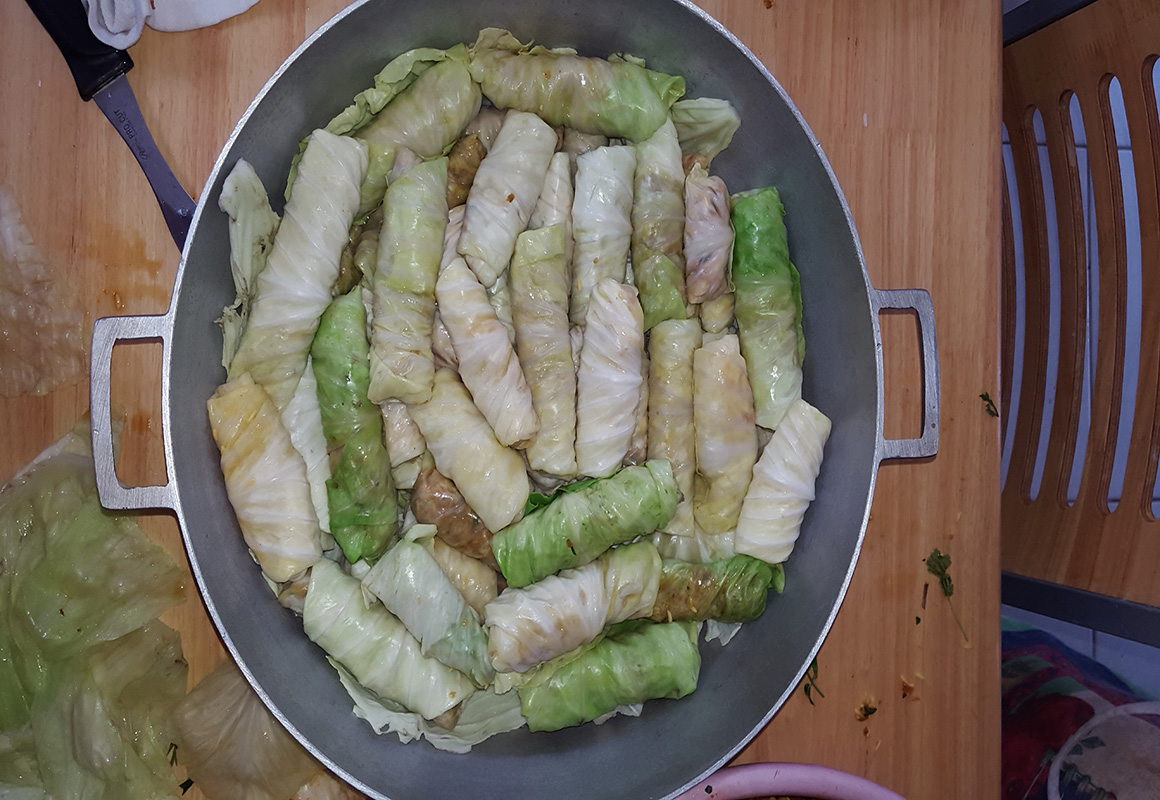By Annick Megie/Image © Tchakayiti
– “Should we cook the rice and meat first?”
– “The recipe says not to cook them, but you know what? Let’s cook them.”
– “Then again, maybe they know what they’re talking about…”
– “But hold on, if you guys don’t plan to cook it, you need to wash the rice thoroughly, […] I am warning you, the rice should be cooked […]”
– “The video clearly states that you should dip the cabbage in hot water and then take it out.”
– “But I am telling you, if you don’t turn off the stove the cabbage will be fully cooked and we won’t be able to use its leaves.”
– “Ladies, I don’t know what y’all heard or read but this is how I do it, and my way is definitely the right way […]”
– “Good thing we didn’t follow that recipe, Yaya you are truly the owner of this kitchen. You’re our Top Chef today and from now on everything you say in this kitchen goes.”
Such were the exchanges that took place in my aunt’s kitchen on Mardi-Gras, February 9, 2016 as seven women gathered around a table extracting and rolling stuffed cabbage leaves, in an attempt to make a Middle Eastern-inspired dish we had always wanted to learn to prepare.
That day my mom, aunts, great aunts and I had decided to finally give mèchi – cabbage leaves stuffed with a savoury meat and rice filling – a try. (Get the recipe HERE!)
Also on the menu was tabouleh, baked eggplant, a seafood soup and of course some Haitian beignets, a must-have on Mardi-Gras day in Haiti. About 25 family members were invited to partake in the feast.
Our time in the kitchen was heated but fun as we had each walked into that kitchen with our culinary expertise. Even though we had a recipe, the ongoing debate (as you may have gotten from my quick account of our exchanges) was about our course of action. We could not decide whether or not to follow the instructions and tips we had each gotten from talking to others and surfing the web. All of which created a joyous ambiance.
Anilia (affectionately known as Yaya), the family’s oldest cook, impressed us with a stubbornness that made us laugh and also earned her the title “Top Chef” of that kitchen. Because video demonstration or not, she had refused to follow the methods we were trying to use, which actually helped us greatly. Turns out that in spite of our apprehensions she had more savoir-faire than the online recipe writer we had chosen.
The highlight of those long hours in the kitchen came with the sampling. The smaller mèchi we had cooked in advance to test, came out extremely spicy. So spicy that we were sure my uncle from my Piment Bouc & the Red-faced Guy article wouldn’t be the only one turning red at the table come dinner time. I should probably mention here that my aunt and I had decided at the last minute to add some piment bouc to the mix. Therefore, we were convinced that it was our fault and upset about it. Those mèchi were fiery hot but there was no way that we could discard them. We had a hungry crowd to feed…
Luckily, Anilia being the “Top Chef” that she is, figured out where we had gone wrong. Our [my aunt and I] last minute decision had not ruined the mèchi after all. The sample mèchi had gotten their spiciness from the cookware. The pot that we had cooked them in had been used so often to prepare piman (hot pepper in Creole) that it was infused with those spicy flavours, much like it often happens with our wooden mortar and pestle. We were safe – the mèchi we would serve at dinner time would be edible!
We were all thankful for the beloved Yaya that day. What would we have done without her in that kitchen with us? Her stubbornness and savoir-faire definitely saved the day countless times and taught us many lessons.
Her food and artistry got transferred to three generations and that is the beauty of spending time in the kitchen with seven Haitian, women cooks!

